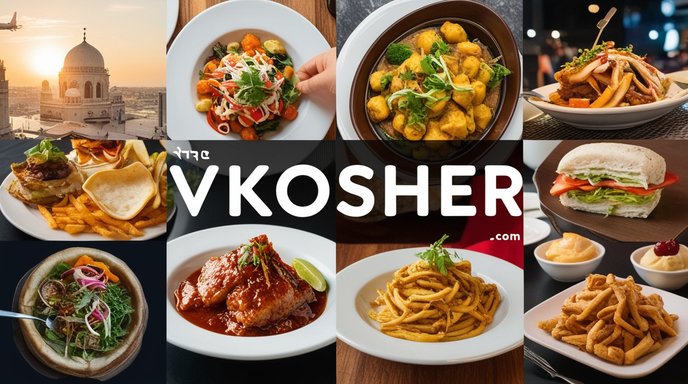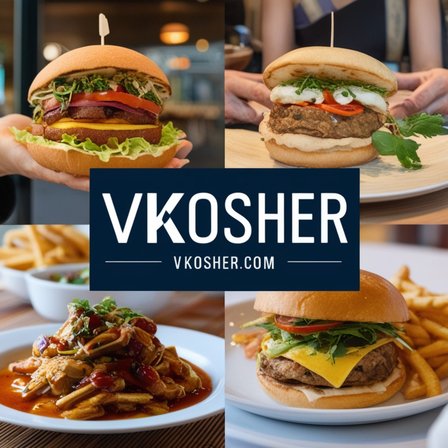Exploring the World of Kosher Wagyu: A Fusion of Tradition and Excellence
Introduction to Kosher Wagyu
Kosher Wagyu represents an extraordinary intersection of culinary excellence and religious adherence. At its core, Wagyu beef is renowned for its unparalleled marbling, tenderness, and rich flavor profile, attributes that make it a highly sought-after delicacy in the culinary world. When this premium beef is prepared according to kosher dietary laws, it adds a layer of spiritual and ethical significance, catering to both the discerning palate and the observant consumer.
Wagyu, a term that translates to "Japanese cow," denotes several breeds of cattle originally from Japan, most notably the Japanese Black, Japanese Brown, Japanese Shorthorn, and Japanese Polled. These breeds are celebrated for their genetic predisposition to produce meat with a high degree of marbling, which results in an incredibly tender texture and a deep, buttery flavor. Kosher Wagyu combines this esteemed quality with adherence to kosher standards, ensuring that every aspect of its production and preparation aligns with Jewish dietary laws.
Understanding Kosher Dietary Laws
The term "kosher" refers to food that is prepared in accordance with Jewish dietary laws, known as kashrut. These laws are derived from the Torah and include a range of guidelines regarding the types of food that can be consumed, how they must be prepared, and how they must be separated. For meat to be considered kosher, it must come from a permitted animal that has been slaughtered and processed in a specific manner. The animal must be healthy at the time of slaughter, and the process must be carried out by a trained individual, known as a shochet, who performs the slaughter in a humane and precise manner.
In addition to these requirements, kosher meat must undergo a process called "bedikat," which involves checking for any signs of disease or abnormalities. The meat is then salted and soaked to remove any remaining blood, as the consumption of blood is prohibited in kashrut. For Wagyu beef to be classified as kosher, it must adhere to these rigorous standards, ensuring that it meets both the spiritual and dietary requirements of the Jewish faith.
The Journey of Wagyu from Japan to Kosher Markets
The journey of Wagyu beef from Japan to kosher markets involves a complex and meticulous process. Traditionally, Wagyu cattle are raised in Japan with a focus on their well-being and diet, which includes high-quality feed and sometimes even massages to enhance the meat's marbling. The production process is closely monitored to ensure the highest quality, and this attention to detail extends to the preparation of kosher Wagyu.
To bring Wagyu to kosher consumers, the cattle must be imported and processed in facilities that meet kosher standards. This often involves partnerships between Japanese producers and kosher-certifying agencies to ensure that every step of the process, from slaughter to packaging, complies with kosher laws. The meat is then distributed to kosher markets and restaurants, where it can be enjoyed by those who adhere to these dietary guidelines.
The Unique Characteristics of Kosher Wagyu
Kosher Wagyu is distinguished by several key characteristics that set it apart from other types of beef. The most notable feature is its exceptional marbling, which refers to the intramuscular fat that gives the meat its rich flavor and tender texture. This marbling is a result of the breed's genetic predisposition and the meticulous care given to the cattle's diet and environment.
In addition to its marbling, kosher Wagyu is known for its unique flavor profile. The meat has a buttery, melt-in-the-mouth quality that is the result of its high fat content and the specific way it is raised and processed. The kosher certification adds an extra layer of authenticity and trust, as it ensures that the meat has been prepared in accordance with religious and ethical standards.
Cooking and Enjoying Kosher Wagyu
Cooking kosher Wagyu requires a delicate touch to preserve its exceptional flavor and texture. The high fat content of Wagyu beef means that it should be cooked gently to avoid rendering out too much fat and to ensure that it remains tender and juicy. Common methods for cooking Wagyu include grilling, pan-searing, and sous-vide, each of which can bring out different aspects of the meat's flavor profile.
Grilling is a popular method for cooking Wagyu, as it allows the meat to develop a flavorful crust while maintaining its tender interior. When grilling, it is important to use a high heat to quickly sear the meat and lock in its juices. Pan-searing is another excellent method, as it allows for precise control over the cooking temperature and helps to develop a rich, caramelized crust. Sous-vide, a technique that involves cooking the meat in a vacuum-sealed bag in a water bath at a precise temperature, is also well-suited to Wagyu, as it ensures even cooking and preserves the meat's tenderness.
Pairing kosher Wagyu with the right accompaniments can enhance the dining experience. Because of its rich flavor, Wagyu pairs well with simple, complementary sides that do not overpower the meat. Traditional accompaniments include roasted vegetables, mashed potatoes, or a fresh salad. Additionally, kosher Wagyu can be enjoyed with a variety of sauces and seasonings, from classic steakhouse fare like béarnaise or chimichurri to more adventurous options like miso or soy-based glazes.
The Future of Kosher Wagyu
As the demand for high-quality, ethically-produced food continues to grow, the future of kosher Wagyu looks promising. The combination of Wagyu's renowned quality with kosher certification opens up new opportunities for both producers and consumers. As more people seek out premium, responsibly-sourced food, kosher Wagyu is poised to become a sought-after choice for those who value both exceptional flavor and adherence to dietary laws.
In addition to its culinary appeal, kosher Wagyu also represents a broader trend towards transparency and sustainability in food production. By adhering to rigorous standards and embracing ethical practices, kosher Wagyu producers contribute to a more responsible and conscientious food system. This alignment with contemporary values, combined with the enduring appeal of Wagyu beef, suggests a bright future for this unique fusion of tradition and excellence.
Conclusion
Kosher Wagyu is a remarkable example of how tradition and innovation can come together to create something truly exceptional. By combining the renowned qualities of Wagyu beef with the principles of kosher dietary laws, this unique product offers a blend of culinary excellence and spiritual significance. Whether enjoyed in a fine dining setting or prepared at home, kosher Wagyu represents a harmonious balance of taste, quality, and adherence to values. As the market for premium, ethically-produced food continues to expand, kosher Wagyu stands out as a testament to the possibilities that arise when tradition meets excellence.
Introduction to Kosher Wagyu
Kosher Wagyu represents an extraordinary intersection of culinary excellence and religious adherence. At its core, Wagyu beef is renowned for its unparalleled marbling, tenderness, and rich flavor profile, attributes that make it a highly sought-after delicacy in the culinary world. When this premium beef is prepared according to kosher dietary laws, it adds a layer of spiritual and ethical significance, catering to both the discerning palate and the observant consumer.
Wagyu, a term that translates to "Japanese cow," denotes several breeds of cattle originally from Japan, most notably the Japanese Black, Japanese Brown, Japanese Shorthorn, and Japanese Polled. These breeds are celebrated for their genetic predisposition to produce meat with a high degree of marbling, which results in an incredibly tender texture and a deep, buttery flavor. Kosher Wagyu combines this esteemed quality with adherence to kosher standards, ensuring that every aspect of its production and preparation aligns with Jewish dietary laws.
Understanding Kosher Dietary Laws
The term "kosher" refers to food that is prepared in accordance with Jewish dietary laws, known as kashrut. These laws are derived from the Torah and include a range of guidelines regarding the types of food that can be consumed, how they must be prepared, and how they must be separated. For meat to be considered kosher, it must come from a permitted animal that has been slaughtered and processed in a specific manner. The animal must be healthy at the time of slaughter, and the process must be carried out by a trained individual, known as a shochet, who performs the slaughter in a humane and precise manner.
In addition to these requirements, kosher meat must undergo a process called "bedikat," which involves checking for any signs of disease or abnormalities. The meat is then salted and soaked to remove any remaining blood, as the consumption of blood is prohibited in kashrut. For Wagyu beef to be classified as kosher, it must adhere to these rigorous standards, ensuring that it meets both the spiritual and dietary requirements of the Jewish faith.
The Journey of Wagyu from Japan to Kosher Markets
The journey of Wagyu beef from Japan to kosher markets involves a complex and meticulous process. Traditionally, Wagyu cattle are raised in Japan with a focus on their well-being and diet, which includes high-quality feed and sometimes even massages to enhance the meat's marbling. The production process is closely monitored to ensure the highest quality, and this attention to detail extends to the preparation of kosher Wagyu.
To bring Wagyu to kosher consumers, the cattle must be imported and processed in facilities that meet kosher standards. This often involves partnerships between Japanese producers and kosher-certifying agencies to ensure that every step of the process, from slaughter to packaging, complies with kosher laws. The meat is then distributed to kosher markets and restaurants, where it can be enjoyed by those who adhere to these dietary guidelines.
The Unique Characteristics of Kosher Wagyu
Kosher Wagyu is distinguished by several key characteristics that set it apart from other types of beef. The most notable feature is its exceptional marbling, which refers to the intramuscular fat that gives the meat its rich flavor and tender texture. This marbling is a result of the breed's genetic predisposition and the meticulous care given to the cattle's diet and environment.
In addition to its marbling, kosher Wagyu is known for its unique flavor profile. The meat has a buttery, melt-in-the-mouth quality that is the result of its high fat content and the specific way it is raised and processed. The kosher certification adds an extra layer of authenticity and trust, as it ensures that the meat has been prepared in accordance with religious and ethical standards.
Cooking and Enjoying Kosher Wagyu
Cooking kosher Wagyu requires a delicate touch to preserve its exceptional flavor and texture. The high fat content of Wagyu beef means that it should be cooked gently to avoid rendering out too much fat and to ensure that it remains tender and juicy. Common methods for cooking Wagyu include grilling, pan-searing, and sous-vide, each of which can bring out different aspects of the meat's flavor profile.
Grilling is a popular method for cooking Wagyu, as it allows the meat to develop a flavorful crust while maintaining its tender interior. When grilling, it is important to use a high heat to quickly sear the meat and lock in its juices. Pan-searing is another excellent method, as it allows for precise control over the cooking temperature and helps to develop a rich, caramelized crust. Sous-vide, a technique that involves cooking the meat in a vacuum-sealed bag in a water bath at a precise temperature, is also well-suited to Wagyu, as it ensures even cooking and preserves the meat's tenderness.
Pairing kosher Wagyu with the right accompaniments can enhance the dining experience. Because of its rich flavor, Wagyu pairs well with simple, complementary sides that do not overpower the meat. Traditional accompaniments include roasted vegetables, mashed potatoes, or a fresh salad. Additionally, kosher Wagyu can be enjoyed with a variety of sauces and seasonings, from classic steakhouse fare like béarnaise or chimichurri to more adventurous options like miso or soy-based glazes.
The Future of Kosher Wagyu
As the demand for high-quality, ethically-produced food continues to grow, the future of kosher Wagyu looks promising. The combination of Wagyu's renowned quality with kosher certification opens up new opportunities for both producers and consumers. As more people seek out premium, responsibly-sourced food, kosher Wagyu is poised to become a sought-after choice for those who value both exceptional flavor and adherence to dietary laws.
In addition to its culinary appeal, kosher Wagyu also represents a broader trend towards transparency and sustainability in food production. By adhering to rigorous standards and embracing ethical practices, kosher Wagyu producers contribute to a more responsible and conscientious food system. This alignment with contemporary values, combined with the enduring appeal of Wagyu beef, suggests a bright future for this unique fusion of tradition and excellence.
Conclusion
Kosher Wagyu is a remarkable example of how tradition and innovation can come together to create something truly exceptional. By combining the renowned qualities of Wagyu beef with the principles of kosher dietary laws, this unique product offers a blend of culinary excellence and spiritual significance. Whether enjoyed in a fine dining setting or prepared at home, kosher Wagyu represents a harmonious balance of taste, quality, and adherence to values. As the market for premium, ethically-produced food continues to expand, kosher Wagyu stands out as a testament to the possibilities that arise when tradition meets excellence.




